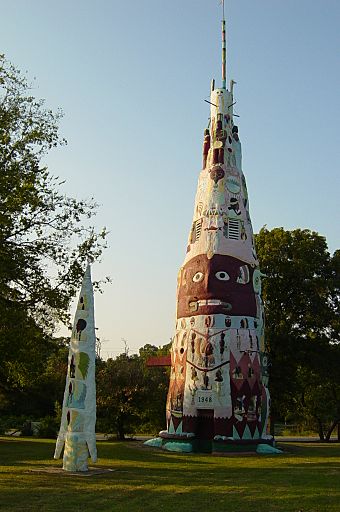Ed Galloway's Totem Pole Park facts for kids
Quick facts for kids |
|
|
Ed Galloway's Totem Pole Park
|
|

Ed Galloway's Totem Pole Park
|
|
| Nearest city | Foyil, Oklahoma |
|---|---|
| Area | 1.4 acres (0.57 ha) |
| Built | 1937 |
| Architect | Nathan Edward Galloway |
| NRHP reference No. | 99000354 |
| Added to NRHP | March 30, 1999 |
Ed Galloway's Totem Pole Park is a unique place in northeastern Oklahoma. It features eleven large sculptures and one building. The park covers about 1.4 acres (5,700 square meters) in Rogers County. It is located about 10 miles (16 km) northeast of Claremore. You can find it 3.5 miles (5.6 km) east of historic U.S. Route 66 and Foyil. This special park was added to the National Register of Historic Places on March 30, 1999. Today, the Rogers County Historical Society owns and manages the park. The main sculpture, a giant totem pole, is known as the "World’s Largest Concrete Totem Pole."
Contents
The Story of Ed Galloway's Totem Pole Park
Who Was Ed Galloway?
The park was created by a man named Ed Galloway. He was born in Missouri in 1880. Ed served in the US Army in the Philippines. After his military service, he returned to the United States. He began carving large sculptures from tree trunks.
In 1914, a kind person named Charles Page from Tulsa noticed Ed's work. Charles Page hired Ed to teach manual arts. Ed taught at the Children's Home orphanage in Sand Springs, Oklahoma.
Building the Totem Pole Park
Ed Galloway retired in 1937. He then moved to a small farm near Foyil, Oklahoma. This farm was about 10 miles (16 km) northeast of Claremore. It was also 3.5 miles (5.6 km) east of historic Route 66. Soon after moving, Ed started building a huge totem pole.
He used modern building materials for his creation. The main totem pole was made with six tons of steel, 28 tons of cement, and 100 tons of sand and rock. Ed finished this amazing totem pole in 1948. It stands about 90 feet (27 meters) tall. At its base, the totem pole is 30 feet (9.1 meters) wide. It rests on the back of a turtle. This design refers to an old Native American story about how the world was created. The entire totem pole is covered with about 200 detailed images. These images include colorful Native American faces, symbols, and animal figures.
Other Sculptures at the Park
The park also has Ed Galloway's special "Fiddle House." This building has eleven sides. It is supported by 25 concrete totem poles, both inside and out. The Fiddle House used to display Ed's hand-carved fiddles. It also held handmade furniture and portraits of all US Presidents up to John F. Kennedy. Sadly, many of these items were stolen in 1970 and were never found.
Besides the main totem pole and the Fiddle House, the park has more to see. There are four smaller concrete totem poles. You can also find two fancy concrete picnic tables with animal-shaped seats. A barbecue area and four sets of animal-shaped gateposts are also part of the park.
Ed Galloway lived at the park and worked on it every day. He continued his work until he passed away in 1962. Some people believe he wanted to teach young people about Native Americans through his art. Others think he hoped the park would be a great place for kids, especially Boy Scouts, to visit.
Restoring the Totem Pole Park
Why Restoration Was Needed
After Ed Galloway passed away, the sculptures began to wear down. Weather and lack of care caused them to deteriorate over many years.
How the Park Was Restored
In the 1990s, the Kansas Grassroots Art Association started a big project to restore the park. They worked hard to fix and repaint the outdoor sculptures. The Fiddle House was also in bad shape, almost collapsing. It was saved and turned into the Fiddle House Museum and Gift Shop.
More restoration work was done on the main totem pole. The lower 20 feet (6.1 meters) of the pole were repaired between 2008 and 2009. Work on the upper part of the totem pole began in mid-June 2015. This important restoration was completed by mid-August 2020. Thanks to these efforts, Ed Galloway's Totem Pole Park continues to be a wonderful place for everyone to enjoy.
 | Toni Morrison |
 | Barack Obama |
 | Martin Luther King Jr. |
 | Ralph Bunche |



